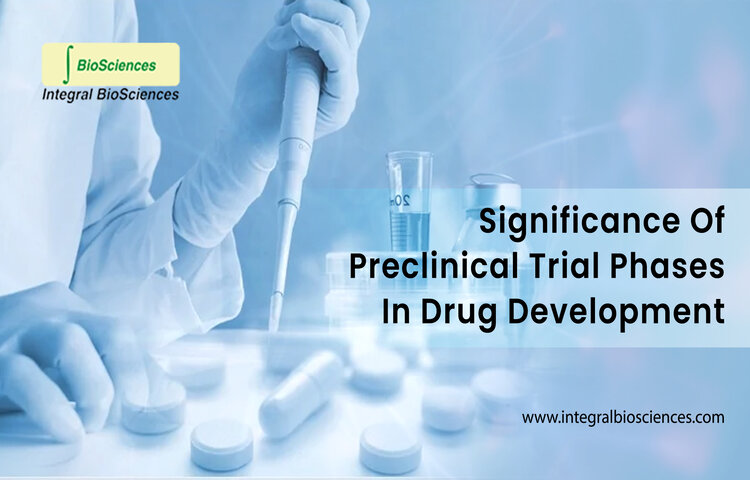
What Is The Significance Of Preclinical Trial Phases In Drug Development
The drug discovery cycle comprises many kinds of phases and preclinical trial phases are one of the most significant phases. Preclinical studies, also known as preclinical development or nonclinical studies. As the term itself suggests, it includes those phases of the drug designing cycle which are done before clinical trials i.e; testing in humans.
The preclinical studies are done to understand the parallel between the real and the intended biological effect of a drug on an animal, primarily humans in order to predict the level of its efficacy. These trial phases enable the bioscientists to determine adverse events in people and to assess the risks to ensure safety.
Introduction to Preclinical Studies
Preclinical studies aid the drug discovery CROs to determine the feasibility and safety of drug compounds. There are certain tests that are iteratively done on laboratory animals to study the above-mentioned aspects of the respective drug compound. The data gained through these tests is vital for further processes of drug discovery.
The primary objective of preclinical development solutions by a drug discovery CRO is to determine an initial dose for safe testing on humans. As the new drug compound or medical devices may pose risk to their health, thus it becomes crucial to assess the potential toxicity of that therapeutic drug or device.
Drug discovery CROs yield the data through preclinical trial phases and study the corresponding statistics to illustrate the risks. Generally, only one in every 5,000 potential drug compounds from the preclinical development phase becomes an approved drug. This fact alone is enough to signify the importance of the preclinical phases of drug discovery.
Major Steps of Preclinclinal Trial Phase in Drug Discovery
Major steps followed during the preclinical trial phase in drug discovery are as follows.
- Get the idea for drug target (Target validation)
- Develop the bioassay
- Screen chemical compounds in assay
- Determine effective and toxic doses
- File for approval as an Investigational New Drug (IND) and lead to clinical trials
Major Types of Preclinical Research
Preclinical development solutions are categorised mainly into two categories, exploratory and confirmatory research. Let us have a brief elaboration on these two categories.
Exploratory Preclinical Studies: As the term itself suggests, this category of preclinical trial phases studies aims to produce theories regarding the pathophysiology of the disease. This can be called hypothesis generating as it is often driven by a series of hypotheses that are either confirmed or denied over the course of sequential experiments.
As it aims primarily at developing pathophysiological theories that enable the pursuit of different approaches, exploratory research studies consist of a package of small and flexible experiments including molecular and cellular analyses.
Confirmatory Preclinical Studies: This type of preclinical research seeks to discover exploratory aspects as clearly defined intervention effects in relevant animal models. This research type can be called hypothesis testing as it focuses more rigorously on testing a drug’s clinical potential and less on elaborating theories or mechanisms of a drug’s action.
These studies are adequately powered clinical trials or “efficacy studies” and rely on robust and pre-specified designs, prolonged durations, a priori stated hypotheses and clinically relevant assays. This type of preclinical research can be held as a major reason in restricting the ineffective drug candidates from getting advanced into the clinical testing phase.
It is important to note that there can be exploratory and confirmatory components within the same studies. Thus, both research can be closely linked sometimes. Also, it might not be necessary to apply strictness on some of the parameters during exploratory studies such as sample size estimation and binding, whereas these parameters are significant in the case of confirmatory research.
Major Purpose Of Preclinical Development Solution
A drug compound may undergo different types of testing according to the purpose of preclinical studies. Some of the major reasons for those testings are as enlisted below.
- Pharmacodynamics (PD): This branch of pharmacology involves the study of the effects of drugs and the mechanism of their action. Preclinical studies of potential drug candidates help to understand what it does to the body.
- Pharmacokinetics (PK): This branch of pharmacology deals with the study of the movement of drugs within the body. Preclinical studies done on drug compounds help in understanding what the body does to the drug.
- ADME: This acronym is used for “absorption, distribution, metabolism, and excretion” in drug discovery. These four criteria describe the disposition of a pharmaceutical compound within the animal or human body. This preclinical study helps the bioscientists to assess the influence of drug levels and kinetics of drug exposure to the tissues. It further determines the performance and pharmacological activity of the drug compound.
- Toxicology Testing: This kind of preclinical research determines the degree to which a drug compound negatively impacts the regular biological functions in our body. A drug compound is assessed for toxicity according to the certain exposure duration, route of exposure, and concentration.
Importance of Preclinical Studies in Drug Development
Preclinical research is crucial in order to design more efficient and successful drug development programs. As successful drug development programs depend on gathering information from routine preclinical studies, assess when they may be less predictive, and proceed to consider further scientifically appropriate preclinical studies to make informed drug development decisions for attaining ultimate success in drug discovery projects.
Integral Biosciences: A Reliable CRO For Preclinical Development Solution Integral Biosciences is delivering promising results to numerous clients as a drug discovery CRO for over 13 years. As an organisation having the perfect blend of experience and enthusiasm, IBS is counted among the most reliable destinations for outsourcing drug discovery projects, especially those related to preclinical development. Connect with IBS now and enhance your chances of success in achieving drug discovery goals.
